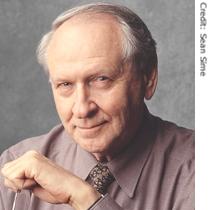 I believe it’s Dr. Phil who asks the rhetorical question, “Who were the 7 people, or the 7 experiences, that changed your life?” Just this weekend, the world of journalism lost William Safire, the well-known conservative columnist and man of letters—he wrote the “On Language” column in the New York Times Magazine until two weeks ago. And I lost one of my 7. I only met him once, and it was years ago, but if that meeting had not taken place, I wouldn’t be an author.
I believe it’s Dr. Phil who asks the rhetorical question, “Who were the 7 people, or the 7 experiences, that changed your life?” Just this weekend, the world of journalism lost William Safire, the well-known conservative columnist and man of letters—he wrote the “On Language” column in the New York Times Magazine until two weeks ago. And I lost one of my 7. I only met him once, and it was years ago, but if that meeting had not taken place, I wouldn’t be an author.
It was 1976. The Republican Convention was happening in my hometown, Kansas City, Missouri. I was heading downtown on the bus when a well-dressed man tried to board and was told he’d have to get off since he didn’t have correct change. To defend the honor of my city against a relentless bus driver, I produced the 65 cents (or whatever it was) and the visitor sat down next to me, thanked me, extended his hand, and said, “William Safire, New York Times.” I had no idea who he was and said, “Vicki Mucie [my abbreviated and maiden name], The Independent.” That was the local magazine where I worked: The Independent, Kansas City’s Weekly Journal of Society Since 1899.
He was in town for the convention and wanted to find an antiquarian bookstore. He was looking for a particular Chinese volume and made of point of trying to find it everywhere he traveled. I said I’d take him to the best one in town and, Eureka! Glenn’s Books and Maps had the rare tome he’d been looking for. He was overjoyed and insisted on taking me to lunch in gratitude. That was fine. I was hungry.
He told me that he’d been a speechwriter for Richard Nixon and providentially took the job with The Times one month before Watergate. This was all very strange to me. I was a Missouri girl—Harry Truman country—and came from a family that said things like, “The last good thing a Republican ever did was when Lincoln freed the slaves.” And this man, who seemed nice enough, was telling me that he wasn’t just a Republican: he was a conservative. I’d never met one before. I thought they were all hunkered down in barracks somewhere having Trilateral Commission meetings. “It’s not that conservatives want to kill babies or that liberals want to bankrupt the country,” my East Coast acquaintance explained. “Those are just the myths. We all want what’s best and we just see that differently.” Huh. Well, I’ll be.
He asked about my writing and said that he could tell by the way I spoke that I was a good writer. But he was also interviewing me in a way, asking me questions about politics for which I had no answers, but I was willing to make some up. I mean, he was buying lunch, after all. “What do you think about Jimmy Carter [the newly selected Democratic Presidential nominee]?” he asked. Truth was, I didn’t think anything about him. I was in my twenties. I thought about clothes and dieting and when my boyfriend would come up with a ring. In my defense, I was a vegetarian and cared about animals, and I’d done some anti-war protesting, but I was pretty apolitical. Still, I had to say something he’d like, so I came up with: “I think the American people are afraid of Jimmy Carter. He’s an unknown quantity. He came out of nowhere and nobody knows where he stands on the vital issues.” Safire nodded. I thought I’d done fine.
He told me that he didn’t want to go to the nomination that night and see it go to Gerald Ford instead of his guy, Ronald Reagan, and asked if I’d like his ticket. That sounded fun. He was handing it to me when the waiter brought back the credit card receipt and was stuttering compliments. He asked if my lunch partner would sign an autograph, explained that he read Safire’s column religiously, and was, in fact, a political science major at Rockhurst, a Jesuit college in Kansas City. Gosh, I’m thinking, who is this guy who just bought me lunch?
As we parted, I thanked him for the invitation that would get me into the convention center and onto the press buses shuttling the 4th estate to and fro. And he looked me in the eye and said: “I expect a book out of you. You’re not getting any younger.”
What a double-whammy! First was the incredible confidence from this near-stranger that I could actually write something more than a magazine article: I could write a book with a publisher and a cover and a life in libraries and on people’s shelves that would go beyond my own life. I had never until that moment believed I was capable of such a thing. But once he said it, I believed it.
Then there was the “you’re not getting any younger” thing. That was a shocker. Young was what I was and who I was. I’d always been young. What else could I be? I knew in a general way, of course, that youth was temporary for all creatures, but until he said it, I don’t think I believed that my own particular youth had an expiration date.
I went to the inauguration (everybody should be at one in their life) and soon after that, the hotels emptied and the cameras went away. It was just Kansas City again. I opened the evening Kansas City Star (there were two editions in those days) at my desk at The Independent and there was Safire’s column. I’m paraphrasing a memory of over thirty years, but it basically said, “The American people are afraid of Jimmy Carter. They see him as an unknown quantity. He came from out of nowhere and they don’t know where he stands on the vital issues.” He had been interviewing me. Who knew?
It got better. The next day, or the one after that, again at my desk in the late afternoon, I’m skimming the paper and see the headline (again, perhaps not word-for-word, but close): “President Says ‘Public Fears Carter'”—and right there in newsprint from Gerald Ford, sitting President of the USA: “The American people are afraid of Jimmy Carter. They see him as an unknown quantity. He came out of nowhere and they don’t know where he stands on the vital issues.” I was in shock. I said that to Safire. He wrote it to the newspaper-reading world. And the President of the United States was quoting him—quoting me! And I hadn’t even known what I was talking about. I got the six-degrees-of-separation thing down pat in that moment, and the truism that when talking to a journalist, “Nothing is off the record.”
I never saw Mr. Safire again in my life. We kept in touch every few years. He’d send me a book he’d written and when my books started coming, I sent some of them to him. Once or twice he responding with a quick note, something like, “See, I told you you could write.” I should have saved those, but I’ve moved fourteen times since 1976, and I’ve never been one to collect things.
Our last correspondence was in 2007, via email. I asked if he’d consider doing an “About Words” column on the (ugly) words, “fat, broke, and lonely” that my editor had encouraged me to write a book about (Fat, Broke & Lonely No More—‘turned out to be one of my favorite books, but I was never able to warm to the title). He said to send the book, adding, “You’re a good writer.” I didn’t hear anything else. I guess he was no more inspired by those three words than I’d been. But the fact that they’re the title of a book I wrote, and that it’s one of ten, goes back to that day on the bus when 65 cents got me a famous friend who told me what he expected.
Thank you, Bill Safire. Godspeed.

